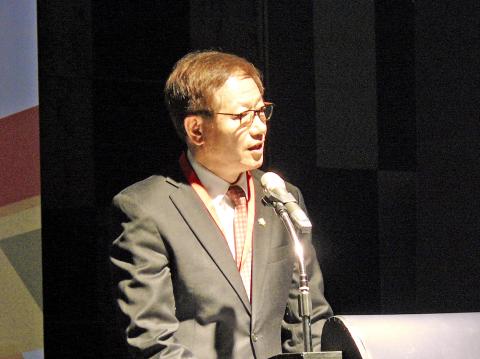Taiwan Semiconductor Manufacturing Co (TSMC, 台積電) yesterday said it plans to start initial chip production using cutting-edge 5-nanometer technology in 2019, possibly allowing the company to pull ahead of peers.
TSMC this year entered the technology development phase for 5-nanometer technology, company co-chief executive officer Mark Liu (劉德音) told the chipmaker’s annual supply chain management forum.
The Hsinchu-based firm has about 6,000 research and development (R&D) personnel working on the development of 5-nanometer technology, Liu said.

Photo: CNA
“TSMC has set a high and aggressive target as its [5-nanometer] technology road map shows,” Clark Tseng (曾瑞榆), a senior semiconductor analyst with Semiconductor Equipment and Materials International, said by telephone. “It is likely that TSMC will lead its competitors in ramping 5-nanometer technology, as no clear road map has been disclosed by Samsung Electronics yet.”
TSMC this year plans to increase R&D spending by 15 percent from last year, alongside a capital expenditure of US$10 billion, to boost its technology leadership, Liu said.
The chipmaker spent US$2.21 billion on R&D last year, the company’s financial statement showed.
TSMC has also tasked several hundred R&D personnel with the initial development of 3-nanometer technology and is evaluating a fab site for 3-nanometer chip production, he added.
“We are optimistic about 3-nanometer” development, Liu said.
As for 7-nanometer technology, Liu said the company is confident that it will stay ahead of its major competitors in ramping up chip production using the advanced technology.
TSMC is to start initial chip production using 7-nanometer technology at the end of this quarter, followed by mass production next year.
Regarding 10-nanometer technology, Liu said 3,000 engineers and 1,500 technicians are working to ship a small volume of chips this quarter.
The volume will increase rapidly from the second quarter, he said.
TSMC has reportedly been tapped as a major chip supplier using the 10-nanometer technology for Apple Inc’s new iPhone models.
The company declined to comment on the reports.
Solid technological capabilities have helped TSMC gain a 65 to 70 percent share of the world’s 16-nanometer chip market and 80 percent share of the 28-nanometer chip market, the firm said.
South Korean rival Samsung Electronics Co yesterday launched its first Exynos processor built on the company’s 10 nanometer FinFet process technology, the company said in a statement.
The advanced processor is in mass production, it said.

SEMICONDUCTORS: The German laser and plasma generator company will expand its local services as its specialized offerings support Taiwan’s semiconductor industries Trumpf SE + Co KG, a global leader in supplying laser technology and plasma generators used in chip production, is expanding its investments in Taiwan in an effort to deeply integrate into the global semiconductor supply chain in the pursuit of growth. The company, headquartered in Ditzingen, Germany, has invested significantly in a newly inaugurated regional technical center for plasma generators in Taoyuan, its latest expansion in Taiwan after being engaged in various industries for more than 25 years. The center, the first of its kind Trumpf built outside Germany, aims to serve customers from Taiwan, Japan, Southeast Asia and South Korea,

Gasoline and diesel prices at domestic fuel stations are to fall NT$0.2 per liter this week, down for a second consecutive week, CPC Corp, Taiwan (台灣中油) and Formosa Petrochemical Corp (台塑石化) announced yesterday. Effective today, gasoline prices at CPC and Formosa stations are to drop to NT$26.4, NT$27.9 and NT$29.9 per liter for 92, 95 and 98-octane unleaded gasoline respectively, the companies said in separate statements. The price of premium diesel is to fall to NT$24.8 per liter at CPC stations and NT$24.6 at Formosa pumps, they said. The price adjustments came even as international crude oil prices rose last week, as traders

Taiwan Semiconductor Manufacturing Co (TSMC, 台積電), which supplies advanced chips to Nvidia Corp and Apple Inc, yesterday reported NT$1.046 trillion (US$33.1 billion) in revenue for last quarter, driven by constantly strong demand for artificial intelligence (AI) chips, falling in the upper end of its forecast. Based on TSMC’s financial guidance, revenue would expand about 22 percent sequentially to the range from US$32.2 billion to US$33.4 billion during the final quarter of 2024, it told investors in October last year. Last year in total, revenue jumped 31.61 percent to NT$3.81 trillion, compared with NT$2.89 trillion generated in the year before, according to

SIZE MATTERS: TSMC started phasing out 8-inch wafer production last year, while Samsung is more aggressively retiring 8-inch capacity, TrendForce said Chipmakers are expected to raise prices of 8-inch wafers by up to 20 percent this year on concern over supply constraints as major contract chipmakers Taiwan Semiconductor Manufacturing Co (TSMC, 台積電) and Samsung Electronics Co gradually retire less advanced wafer capacity, TrendForce Corp (集邦科技) said yesterday. It is the first significant across-the-board price hike since a global semiconductor correction in 2023, the Taipei-based market researcher said in a report. Global 8-inch wafer capacity slid 0.3 percent year-on-year last year, although 8-inch wafer prices still hovered at relatively stable levels throughout the year, TrendForce said. The downward trend is expected to continue this year,